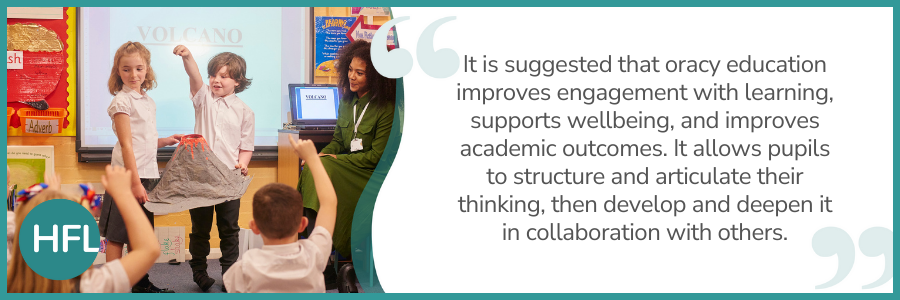
I have been an English adviser for a few years and there’s one area that I’ve failed to have the impact I would have wished to: Oracy.
It seems there is rising interest in government with the Labour Party recently setting out their stall for an oracy curriculum. There is also ‘The Oracy All-Party Parliamentary Group’ (Oracy APPG). They offer the following definition of oracy:
‘The ability to speak eloquently, to articulate ideas and thoughts, to influence through talking, to collaborate with peers, and to express views confidently and appropriately’
A small minority of schools have prioritised this area of the curriculum. Although there is a spoken language programme of study in the national curriculum, few schools have a programme of purposeful and explicit teaching of these skills. It is, of course, common to see group discussions, talk partners and so on, but have the children had explicit instruction? Do they know the skills involved? Do they know how they can manage these? Do they know what they might improve upon?
It is suggested that oracy education improves engagement with learning, supports wellbeing, and improves academic outcomes. It allows pupils to structure and articulate their thinking, then develop and deepen it in collaboration with others.
Why teach oracy?
The most compelling answer is that, as many of you know, is that oracy skills in primary school are a predictor of life outcomes as an adult. The Oracy APPG report highlighted studies illustrating that:
‘One in four pupils who struggled with spoken language at age five did not reach expected standards in English at the end of primary school. In comparison, only one in 25 pupils with good language skills failed to meet expected standards. One in five children with poor language skills at age five did not reach expected standards in maths at the end of primary school, compared with one in 50 who had good language skills.’
It is crucial that oracy is taught (rather than facilitated) and the following are some prompts to promote discussion in your setting and hopefully entice you to investigate this area of education in more detail.
Varying levels of formality – writing and oracy
In writing we support children to write with differing levels of formality, as appropriate to the intended outcome. It is also essential that children are able to vary the levels of formality in their spoken language. We should begin by valuing the children’s home language and dialect and we build their repertoire of variations of formality from there. This supports them to communicate in a variety of situations, sometimes known as ‘code switching’. As able users of language, we are often able to switch effectively between a home language when speaking to family, to something slightly more formal, for example when asking for help in a shop, and further along a scale of formality if speaking to a person of authority. To do this, we don’t just change the words we use, we often change the tempo, volume, manner and accent (I am old enough to remember having a mum who had a ‘telephone voice’). In an ideal world, there would be no reason for children (or adults) to code switch as long as they are communicating effectively. However, in the Oracy APPG, The Times journalist, Terri White noted:
‘Accentism is often aimed at certain regions and people of low socio-economic backgrounds. She added in overcoming accent bias, it is important to ‘empower young people to the best of their ability’.
Accent is only one aspect of varying formality and, as I said, these are points to promote discussion in your school. I’m sure, if you chose to discuss the above point, there would be some very lively interactions.
Reading fluency and oracy
I’ve made a link with writing, and of course, there is also a link with oracy and reading. In reading, we know the importance of teaching fluency. We also need to teach many children to be able to communicate ideas and thoughts in a coherent, fluent manner. It’s amazing sometimes to listen to children explain an idea. Even with the most able language users, you will often find they communicate in very disjointed non-sentences. I was lucky enough to undertake a study tour of education in the USA. We saw some stark differences in US and UK classrooms. However, the most noticeable one of all was that in districts where there was high deprivation, the standards of oracy were remarkably high. One reason for this is that the children are asked to present their learning at length quite often. If you think about your own classroom, how often do children speak for more than one minute at a time and what percentage of your class would do this on a regular basis? Of course, if we return to the link between reading fluency and oral fluency, reading aloud is one way that children can become used to speaking fluently and developing the correct levels of formality.
‘Speak for Change’ Oracy Report
The following recommendations were made in the Oracy APPG ‘Speak for Change’ report:
- ‘Recommendation 11 in the cracks in our foundations report sets out that the Department for Education (DfE) should introduce a ring-fenced fund for continuing professional development (CPD) focusing on improving foundational skills in the classroom. This is important in overcoming the issue of teachers feeling ill-equipped and unprepared in teaching foundational skills such as oracy in classrooms.
- Recommendation 14 calls on the DfE to introduce new National Professional Qualifications (NQPs) for leading numeracy and leading oracy.
- Recommendation 15 of the report calls on the DfE to put oracy education on an equal footing with literacy and numeracy by introducing oracy in the national curriculum and piloting new Oracy Hubs, in the style of English and Maths Hubs. ‘
Begin the conversation
Can you get ahead of the curve and consider how you can begin developing the teaching and learning of oracy in your school?
At HFL Education, we are excited to be hosting Neil Mercer, Director of Oracy@Cambridge, at our ‘My Voice, My Writing’ conference. I have to admit to being quite a fan. His book ‘Words and Minds’ changed my classroom practice for ever and led me onto an MEd. Through practice-based research, I developed a deeper understanding of oracy and its benefits for helping children think together.
Join us at the conference to see what you think.
Further oracy reading
Here are some other blogs I have written around this subject:



